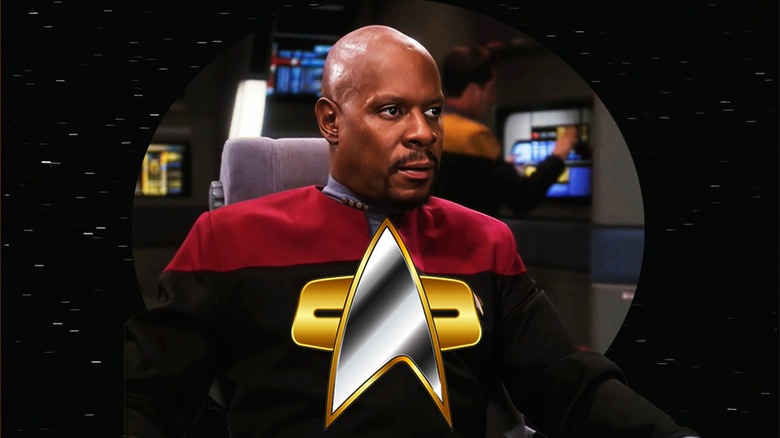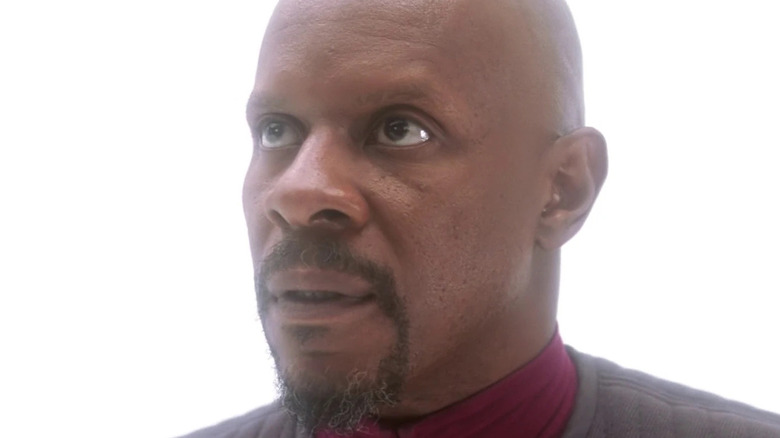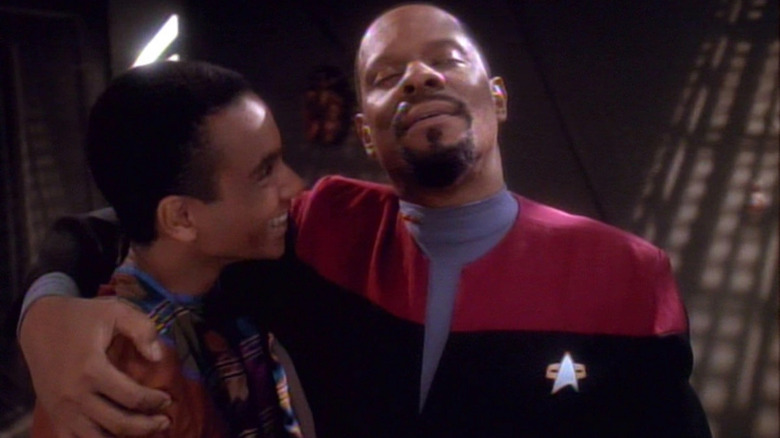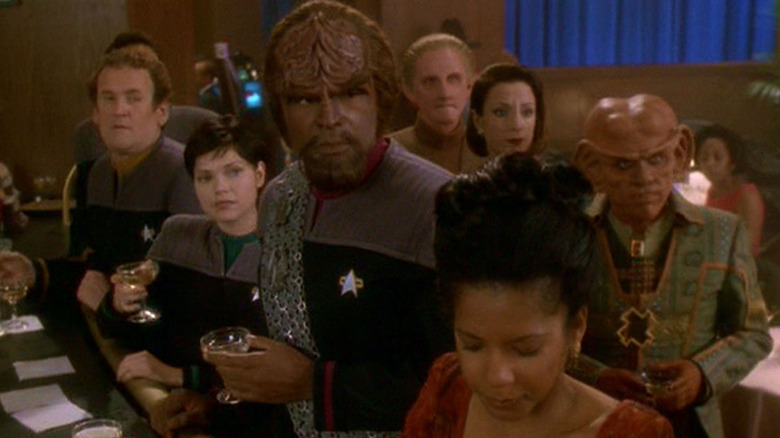As Picard Ends, Star Trek's Last Great Ace In The Hole Is The Return Of Sisko
"Star Trek: Picard" is on its way to wherever streaming shows go when they die — presumably it's that android heaven from Season 1, where a positronic brain can keep functioning with just one neuron so, like, why would you need to build a whole brain in the first place? Okay, let's put that aside.
"Star Trek: Picard" the series has had its ups and downs, its brick oven pizza parties and its reveals that Q (John de Lancie) really just wanted Picard (Patrick Stewart) to get more hugs. However, if there's one thing that the majority of trekkies can agree on, it's that the excitement surrounding the show's debut (has it really been three seasons, already?) was immense. A Pulitzer Prize-winning author took the reins as the showrunner. Beloved characters from one of television's greatest sources of contemplative allegory made a comeback, seemingly guaranteeing, in an age rife with "Star Treks" bathed in abyssal darkness and despair, that we might see a return to thoughtful conversation, political philosophy, and cultural self-reflection through science fiction parables. Your results may have varied. Most of all, though, the hype surrounding "Star Trek: Picard" came courtesy of the fact that there was still life in the bones of "Old Trek," the remnants of the syndicated television age, back when captains were more likely to monologue their way out of a problem than to blow it up.
Fans wanted the good old days again, and the good old captains who inspired them to aspire for optimism. Luckily for Paramount, if they feel the inclination, they've still got one more beloved commanding officer with a story that's begging to be told, and that's Captain Sisko.
It's time to bring back Captain Sisko
Benjamin Lafayette Sisko, played to the gravitas-studded hilt by Avery Brooks, was a lot of things. When he started his tenure aboard Deep Space Nine, he was the antithesis to traditional "Star Trek" captains. Instead of peacocking on the bridge of a Federation flagship, he got to scramble to keep a decrepit, booby trapped, barely-functioning space station from springing a leak. For Sisko, Gene Roddenberry's dream of a world without interpersonal conflict was worth about as much as a sack of stem bolts, because with a few exceptions, nobody on board DS9 seemed to get along with anybody else.
That's what made Sisko so great. With the disposition and responsibilities of a hardened school principal who would really rather be somewhere else, Sisko held sway, made the best of a bad situation, and did what he could to keep the peace, putting forth a positive attitude and encouragement like a champion role model.
Time went on, and the series got grim — arguably bleaker than any "Trek" before it. Thanks to writing that went deeper than anyone asked it to and acting that elevated already impressive scripts, the already great Ben Sisko became an absolute powerhouse of a character. The Dominion War darkened his optimism, leading down critically lauded, fan favorite paths that future showrunners would mistake for being all that "Star Trek" fans wanted. It was the doorway that opened us up to future franchise entries full of death and cruelty and pessimism, but in the moment, it was a previously unexplored labyrinth of emotional complexity, with Sisko taking the lead.
Ben Sisko has some explaining to do
When last we left our hero, Sisko was about to embark on an enigmatic adventure thanks to the spiritual zaniness of the Celestial Temple, the Kubrick-y extratemporal inside bits of the Bajoran wormhole. The benefits: He'd eventually return, untethered by the shackles of space and time, as some messianic transcendental interplanetary deity. Also, what with his new wife Kasidy's (Penny Johnson) recent pregnancy, it meant that it would finally be someone else's turn to raise a Sisko kid as a single parent for a change. Two can play at that game, Jennifer.
That was in June of 1999.
The story of Sisko's return isn't just something that fans have been foaming at the mouth for over the last quarter of a century. In the documentary and "Deep Space Nine" retrospective "What We Left Behind," the creative team behind the series made it about as clear as they could that the reemergence of the Emissary was high on their to-do list. They even used his dramatic reappearance as a capper for their entirely theoretical premiere episode of a totally hypothetical Season 8, which would see Sisko appearing in front of his son, Jake, and apologizing for having "lost track of time." Chilling? Yeah, man. Also, in equal parts, not super helpful. Sisko deserves an end to his story. If only it were that simple.
The complexities of bringing back Ben Sisko
Bringing Ben Sisko back from the great beyond would be a hell of a move, and one that would bring troves of "Deep Space Nine" fans to Paramount+. That said, there would be obstacles.
For one thing, it's been nearly 25 years since the last episode of the show. That's a lot of time. If "Picard" taught us anything these last few seasons, it's that no amount of fan goodwill can undo a script that's a letdown. Sisko's return would have to feel like more than a gimmick — it would have to be earned.
Painfully, tragically, and with respect, there's also the matter of who we've left behind. If you watched "Hear All, Trust Nothing," the DS9 episode of the Easter egg-filled "Lower Decks" that debuted in 2022, you'll have noticed that, following the events of the "Deep Space Nine" series finale, there really weren't that many beloved characters left on the station. Adding to that, time has passed, and the actors who surrounded Avery Brooks on the series aren't all with us anymore. Rene Auberjonois, who played the station's good Constable, Odo, passed away in 2019 at the age of 79. Nog actor Aron Eisenberg died earlier that same year at 50. After so many adventures, struggles, triumphs, and heartbreaks shared with these characters, it's hard for some fans to imagine a return to the station without them.
In the end, the decision to make a "Sisko" series remains in Paramount's court. Would it be difficult? Sure. Does a quarter-century of waiting leave a narrow area in which to stick the landing? You bet. But think of the possibilities. Think of the potential. More than that, think of this: We might finally get a chance to see if Morn ever shut up.



